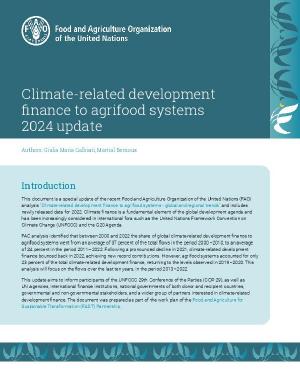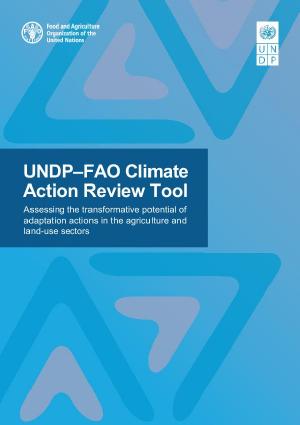Food, Agriculture and Water Day
This year’s COP29 will cast light on the agriculture and food sectors, with a strong emphasis on agrifood systems solutions that lower environmental impact, build resilience, foster biodiversity and enhance food security. Discover FAO events, key initiatives, publications and news dedicated to food, agriculture and water.
On 19 November, the COP29 Presidency and FAO are launching the joint Baku Harmoniya Climate Initiative for Farmers. The Initiative facilitates and supports the transformation of agrifood systems by focusing on three main goals:- Clarifying the landscape of initiatives and offering a platform for better collaboration and exchange of knowledge and experiences.
- Making investments in agrifood systems transformation from both private and public sectors more attractive, while building on strong collaborations with Multilateral Development Banks (MDBs) and Agricultural Public Development Banks (PDBs).
- Supporting the development of climate-resilient villages and rural communities, and strengthening the role of fishers and farmers, in particular, women and young fishers and farmers, for adaptation action in the food, agriculture and water sectors.
Events
FAO is leading and co-leading several events on Food, Agriculture and Water Day and is working with the COP29 Presidency and countries to make agrifood systems a central part of their deliberations, decisions and action agenda on Food, Agriculture and Water Day.
Key Presidency events and joint mandated events
Time | Event | Venue |
|---|---|---|
9:00-10:30 | Opening and Launch of Baku Harmoniya Climate Initiative for Farmers:
Empowering Farmers for Climate Resilience | Room 2, Mugham |
9:30-10:30 | Science and innovation for low emission and resilient food systems | Room 3, Hirkan |
11:00-12:30 | COP-to-COP Agrifood legacies: : A key to achieving global climate goals | Room 2, Mugham |
13:00-14:30 | From global goals to local action: regional initiatives to strengthen
resilient agrifood systems | Room 2, Mugham |
13:15-14:45 | TEC-FAO HL Dialogue Moving forward NDC acceleration in agrifood systems: Climate Technology Uptake | Side event room 7 |
15:00-16:30 | Financing the agrifood system transformation | Room 2, Mugham |
15:45-17:15 | Food and Agriculture for Sustainable Transformation (FAST) Partnership Ministerial
Meeting | Room 3, Hirkan |
17:00-18:30 | Making Climate Finance Work for Farmers: On-farm experiences and concrete solutions | Room 2, Mugham |
17:30-18:30 | Enhancing NDC 3.0 agrifood system climate ambition and action | Room 3, Hirkan |
Other events
Empowering coastal communities: Bridging science and finance for climate resilience
Time: 9:00-10:00 (GMT + 4)
Venue: Ocean Pavilion
Organizers: FAO, World Fish
Building on the momentum of four UNFCCC Ocean Dialogues, this event highlights how community-led ecosystem management and nature-based solutions contribute to coastal resilience and demonstrate the importance of connecting science and finance in empowering coastal communities.
Addressing Climate Loss and Damage in Agrifood Systems: Early Warning Systems (EWS), Anticipatory Action (AA) and Humanitarian Action for Building Resilience
Time: 9:00-10:00 (GMT + 4)
Venue: Humanitarian Hub
Organizers: IFRC, FAO
This side event focuses on how climate-related loss and damage is severely impacting vulnerable countries such as Leat Developed Coutries (LDCs) and Small Island Developing States (SIDS). With climate shocks and stresses becoming more frequent and intense, communities are increasingly unable to prevent, anticipate, absorb, and recover and adapt, leading to compounded crises, including conflict, displacement, loss of livelihoods and hunger. The event explores how the newly established financial and technical mechanisms under the UNFCCC, including the Fund for responding to Loss and Damage and Santiago Network, can deliver additional support to most vulnerable and frontline communities to address these adverse impacts with both economic and non-economic dimensions. The event also highlights anticipatory action as an approach that promotes the use of increasingly accurate early warning information to reduce loss and damage caused by climate extremes on the livelihoods and food security of rural populations.
Achieving Global Goal on Adaptation – Opportunities of National Adaptation Planning process
Time: 9:00-10:30 (GMT + 4)
Venue: UNDP Pavilion
Organizers: UNDP, FAO, UNEP, UN Foundation
This event brings together key stakeholders to discuss adaptation planning approaches, focusing on strengthening National Adaptation Plans' (NAP) Monitoring, Evaluation and Learning (MEL) systems to track progress on Global Goal on Adaptation (GGA) targets and explore sectoral integration through a systems approach.
Agricultural Resilience Model of Integrated Climate Services: Insights and Impact of the Agricultural Climate Resilience Enhancement Initiative (ACREI)
Time: 10:00-11:30 (GMT + 4)
Venue: IGAD Pavilion
Organizers: FAO, IGAD
Livestream: Youtube Livestream
This side event presents insights into the barriers and enablers for building climate resilience and adaptation among smallholder farmers in East Africa. It will showcase the climate-service-to-climate-resilience approach and model employed by the ACREI project, while also highlighting how participatory processes can effectively engage farmers in agrometeorological decision-making. Additionally, the event will reflect on the initiative's impact and lessons learned, and explore opportunities to scale up the ACREI model and tools in various regions and contexts.
Enhancing Peatland Conservation: Advancements in Carbon Measurement through Peat GWL Management
Time: 11:30-12:50 (GMT + 4)
Venue: Indonesia Pavilion
Organizers: Ministry of Environment and Forestry, Republic of Indonesia, FAO
Livestream: Youtube Livestream
This event explores opportunities for achieving Indonesia's commitment to continuously exploring ways to accelerate progress toward the Net Zero Emissions (NZE) target by 2060 or sooner. The "Long-Term Strategy for Low Carbon and Climate Resilience 2050" explains that Indonesia will increase its ambition to reduce GHG emissions, with peak national net GHG emissions across all sectors projected to be achieved in 2030, specifically 1,244 million tons of CO2-eq, or the equivalent of 4.23 tons of CO2-eq per capita. Thus, it is projected that by 2050, the level of net emissions will continue to decline to 540 million tons of CO2-eq.
Land Use Action Event: Transforming Land & Ecosystems for a Nature-Positive 2030
Time: 12:00 - 13:30 (GMT + 4)
Venue:
Organizers: FAO, IUCN, HLC team
Livestream: Youtube Livestream
Achieving 2030 biodiversity, climate, and land degradation goals hinges on sustainable land-use systems and resilient terrestrial ecosystems. This session highlights transformative actions proving that a nature-positive, low-emission future is possible, where restored and protected ecosystems boost biodiversity and strengthen community resilience.
Solution showcase on water-resilient food systems (Part 1)
Time: 13:00-14:00 (GMT + 4)
Venue: Spanish Pavilion
Organizers: FAO, IWMI, Spain
Livestream: Youtube Livestream
Discover how water-integrated agri-food systems are revolutionizing our approach to climate action and sustainable development at the groundbreaking "Space to Solutions" event. This pivotal gathering will showcase innovative strategies that not only combat climate change but also accelerate progress towards the Sustainable Development Goals (SDGs) and Paris Agreement targets Climate action through water-efficient agriculture and food systems can build resilience, support adaptation, reduce GHG emissions, and increase carbon sequestration, while ensuring food and water security for all. Learn from cutting-edge solutions that transform agriculture from a climate challenge into a powerful ally, reshaping social, economic, and environmental landscapes worldwide. Explore how integrated water management in agriculture is crucial for sustainability and reducing adverse impacts on communities.
Scaling Up Climate Action and Finance for Food Security in Fragile and Conflict-affected
Time: 13:30-14:30 (GMT + 4)
Venue: Humanitarian Hub
Organizers: FAO, WFP, IFAD
Livestream: Youtube Livestream
This event is co-organized by FAO, WFP and IFAD as a follow-up to the high-level event held in June 2024, where the three Rome Based Agencies (RBAs), in partnership with the COP29 Azerbaijan Presidency and the COP28 Presidency, convened a high-level panel on "Partnering to Scale Up Climate Actions in Fragile and Conflict-Affected Situations: Zooming in on Food Security." The objective is to mobilize attention and coordinated efforts to address the pressing challenges of climate-related shocks and their impact on agrifood systems and food security in fragile contexts. The event features a fireside chat involving representatives from donor organizations, national governments, civil society from marginalized communities in fragile countries with WFP, FAO and IFAD facilitating the conversation.
Driving climate action at the community level: what arguments can tip the balance?
Time: 13:45-14:45 (GMT + 4)
Venue: Francophonie Pavilion
Organizers: FAO, AFDB, Burundi, Senegal, SOCODEVI, IFDD
Livestream: https://epavillonclimatique.francophonie.org/programmation/588
This event strengthens the case for financing climate action at community level. The event explores innovative community-led strategies that strengthen climate resilience, drawing on francophone experiences from Burundi, Quebec, Senegal and the African Development Bank. Participants will have the opportunity to exchange and identify key obstacles and concrete solutions to mobilize resources that can be effectively directed to producers and their communities.
Maximizing Health Co-benefits: Linking Climate Action to Public Health Gains
Time: 15:15-16:30 (GMT + 4)
Venue: WHO health pavilion
Organizers: WHO
This session explores health co-benefits by examining how they can act as a catalyst for stronger climate action. FAO on behalf of the Initiative on Climate Action and Nutrition (I-CAN) will share integrated solutions from agrifood systems.
The NDC 3.0 Navigator - A Deeper Dive on Methane Reduction in Food Systems
Time: 16:45-18:15 (GMT + 4)
Venue: Side event room 7
Organizers: FAO, World Bank, IFAD
Livestream: Youtube Livestream
Methane reduction in food systems is critical for achieving the goals of the Paris Agreement and limiting global temperature rise to 1.5°C. This event showcases the NDC 3.0 Navigator, which aims at helping countries enhance their NDCs, with a key focus on high-impact, feasible solutions for methane reduction in agriculture.
Relevant publications
Latest news

High-Level Dialogue - Moving Forward with NDC Acceleration in Agrifood Systems: Climate Technology Uptake
19/11/2024

Making Climate Finance Work for Farmers: On-farm Experiences and Concrete Solutions
19/11/2024

Food and Agriculture for Sustainable Transformation (FAST) Partnership Ministerial Meeting
19/11/2024
Related links
- Food and Agriculture for Sustainable Transformation (FAST) Partnership
- Enhanced Transparency Framework (ETF)
- Scaling up Climate Ambition on Land Use and Agriculture through Nationally Determined Contributions and National Adaptation Plans (SCALA)
- FAO's work on climate change
- FAO Office of Climate Change, Biodiversity and Environment












